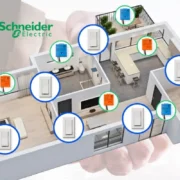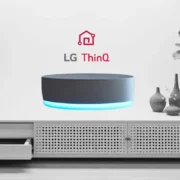Having security cameras in your home can help you keep it safe. Visible cameras seem to discourage criminal activity, according to some studies. According to FBI research, most burglaries aren’t planned in advance – they happen as a result of an opportunity.
Installing a home security system will make sure that your home doesn’t present itself as a potential target. It can include smart locks for protection, sensors to detect any unusual activity, and security cameras for monitoring.
The question is, which security camera is the right one for you? The type of camera depends on whether it is wired or wireless. There are pros and cons to each, which may make it an ideal choice for your situation or a hassle in comparison. In order to help you decide which is best for you, we’ll explain the differences between wired and wireless security cameras.

A wired home security camera system
Typically, a wired home security camera is hardwired to a constant power source. Typically, these cameras are permanently or semi-permanently positioned around your house, connected to a central hub that functions as your home security system’s brain. Power, internet connectivity, and communication capabilities are all provided by the wiring. Depending on the situation, this may be a single cable, like a power over Ethernet cable.
Video footage from wired home security cameras can be viewed locally or remotely, depending on the system. The footage of these systems is typically stored on a digital video recorder. Coaxial cables are sometimes used to transfer footage from cameras to the hub. Power cables are typically required to keep the cameras connected to these systems.
Several hardwired cameras are equipped with internet connectivity, which allows access via a network video recorder. PoE cables typically are used here, and remote access is possible.
Advantages
Video quality is typically better with a wired home security camera since it is hardwired and has a steady connection. For that reason, a wired home security camera is typically more reliable in terms of video and audio quality.
A wired security camera will also have a more reliable and stable connection since it is not dependent on maintaining an internet connection to function. The camera will continue recording footage and sending it to a central location, even if the internet goes down.
As these cameras are not connected to the internet, they are less susceptible to hacking and other potential security breaches. When it comes to home security, the last thing you want is for the system to open new avenues for privacy invasion. In this regard, wired security cameras are less likely to pose a risk.
Disadvantages
One of the biggest drawbacks of wired security cameras is that they are wired. It is costly and time consuming to run wires from the central hub to each camera location. A four-camera system may cost as much as $2,000, according to some estimates. Professional installation is typically required for these systems.
It is also hard to move or change most wired home security systems. If you install a wired security camera system, you can expect it to stay with your home if you move. In most cases, wired home security cameras are permanent fixtures in the home they are installed in, so uninstalling them to move them is expensive — and then you have to pay to have them installed in a new location, too.
The wired home security camera also has the problem of shutting off during power outages, which is another potential issue. In most cases, backup power sources, such as batteries, are present, but they are largely dependent on being plugged in. If you lose power, you may not be able to see your cameras.
A wireless home security camera system
There are still some wireless cameras that need to be wired for power, but many of them are battery-powered — which is why they are often referred to as wire-free cameras. They don’t require a wired connection to operate. It is more common for wireless systems that plug in to be always-on systems. Wireless cameras are usually activated by a sensor and begin recording when they detect activity.
These cameras typically upload video footage to a cloud server once they have a Wi-Fi connection. They are connected via Wi-Fi, which enables them to connect to the internet. Some systems allow you to stream this footage in real time, while others let you archive it for later viewing. While SD cards and USB drives are usually limited in the amount of footage that can be stored, some wireless cameras come with on-board storage that allows some footage to be saved.
Smart home systems like Amazon Alexa, Apple Siri, and Google Assistant can be integrated with wireless home security cameras.
Advantages
Due to their ease of installation and set-up, wireless home security cameras have made home security more accessible. They do not require hardwiring like wired cameras, so you won’t be required to run electrical wires through your house to connect them. Place the cameras near outlets that can be plugged into or use battery-operated cameras that can be put anywhere.
Due to the amount of wiring and work required to set up wired home security systems, wireless security cameras are easy to scale. Wireless systems can consist of many cameras because they’re more affordable and don’t require much setup to get them online. Wireless systems have limited capabilities.
Since wireless home security cameras are not reliant on a central power source, they are also more likely to survive a power outage than wired cameras. A loss of power around your home will not affect wire-free cameras at all because they are entirely battery-powered.
Disadvantages
It is easy to set up wireless security cameras and to get them online, but their connections are often unreliable. If your wireless network fails or is unstable in any way, they are prone to losing connection. In the event of an internet outage, you can’t access your camera because you’re in the dark.
Wireless security cameras can also become a vector of attack for your home since they are constantly connected to the internet. You can take steps to protect your privacy by using wireless security cameras, however.
Although wireless home security cameras do not require a wired connection, they still require power, whether it’s a nearby plug that limits your options for where to install it or batteries that must be changed over time. If you have a wireless camera system, make sure it is powered and working correctly.
Depending on your home’s needs and your expectations, you should choose a wired or wireless home security camera. With wireless security cameras, you will have access to high quality footage, convenience, and accessibility at an affordable price. It might be better to choose a wired security camera if you’re looking for something more permanent, with high-quality footage and 24/7 monitoring.












Comments